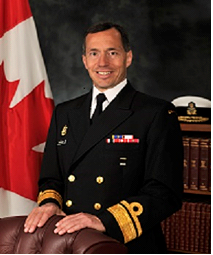Guest Speaker - Rear Admiral Gilles Couturier
REAR ADMIRALGILLES COUTURIER, OMM, CD
COMMANDER
MARITIME FORCES PACIFIC
JOINT TASK FORCE (PACIFIC)
COMMANDER
MARITIME FORCES PACIFIC
JOINT TASK FORCE (PACIFIC)
RAdm Couturier joined the Navy in 1983 from Sept-iles, Québec. He is currently the Commander of the West Coast Navy and the most senior officer of the Canadian Armed Forces in British Columbia.
Highlights of Rear Admiral Couturier’s operational tours include deploying onboard the US carrier ABRAHAM LINCOLN, Commanding Officer of Her Majesty Canadian Ship FREDERICTON where amongst other tasks he deployed to the coast of Africa for an RCMP lead operation that resulted in the seizure of 22.5 tons of hashish bound for the East Coast of Canada. He was also the Royal Canadian Navy lead for Maritime Security for the Vancouver 2010 Olympic and the Maritime Component Commander for RIMPAC 2014, the largest maritime exercise in the world that takes place off the coast of Hawaii and includes over 49 ships and 20 000 sailors.
RAdm Couturier’s senior appointments have included Executive Assistant to the Chief of Defence Staff, Deputy Director for Military to Military capacity building at US Central Command in Tampa, Florida; and back in Ottawa as the Lead planner for the Canadian Armed Forces and finally as the Director General International Security Policy for National Defence.
RAdm Couturier still has a passion for our national sport and attempts to put the blades on as often as he can.
Guest Speaker Rear Admiral Gilles Couturier, was introduced by Russ Cape.
Rear Admiral Couturier has only been in Victoria for less than a year and is off to Ottawa next month to become the Deputy Commander for the Royal Canadian Navy. We realized why he is being promoted because his speech was fascinating.
First of all, he spoke about the Navy in Victoria. It is the third largest employer in Greater Victoria with a payroll of about $600 M per year. The fleet maintenance that the shipyards are doing puts another $500 M into the local economy. The two main jetties are going to be refurbished which will add another $650 M to the local economy. Between the 4000 sailors and the 2000 civilian employees, there are 6000 community volunteers. The Halifax Class modernization at the Seaspan shipyards has been a $4.2 B project, finished on time and on budget (we were reminded of this several times through the presentation and several club members suggested that the Navy should take over the Regional Sewer project and the Blue Bridge project!). The Rear Admiral has entered into an agreement with Race Rocks, an internet graphics company in Victoria to help design online learning for the Navy across Canada. This will allow sailors to study at home so they don't need to travel away for training, especially right after a sea deployment. Some training needs to be in actual, not online, scenarios. An example of this is fire fighting and the recent fire on HMCS Protecteur was an example of very brave sailors who performed very well, validating the quality of their training.
Rear Admiral Couturier focused on the sailors. He highlighted one reserve sailor who is studying to be an astrophysicist and another who works at the Canada Space Agency as a chemical engineer.
Right now the Navy is paying attention to 4 + 1 'friends' - Russian, Iran, North Korea, China and ISIS. Russia is increasing its activity on the seas and has the best torpedo technology in the world. They have the capability to significantly interfere with all of the undersea cables that are critical to communication systems around the world. Iran already has shown their ability to close the Strait of Hormuz (the entrance into the Persian Gulf). North Korea does not have any missiles that would reach North America; but they are working on it. China continues to build airports on man-made islands in the South China Sea. This allows them to claim 12 miles (up to 350 miles) of water sovereignty around each island and greater ability to stage air control. The Phillipines currently have a complaint against China at the World Court. ISIS are operating in landlocked countries; but, are causing chaos on the seas with millions of refugees. The Navy also helps to monitor movement of potential terrorists on the seas.
The HMCS Winnipeg recently returned from an 8 1/2 month deployment across 22 countries as part of Operation Reassurance by NATO to counter the Russian activity. HMCS Saskatchewan and Edmonton were recently involved in the seizure of 4000 kg of cocaine.
The RCN will participate in RIMPAC this July. It is the biggest exercise in the world, involving 22 countries, 44 ships and 6000 sailors. It allows them to practice working together.
The Navy is getting good at learning from the past and adapting to the future. Their Executive Plan includes 4Es:
- Excellence in operations
- Enable future fleet transition
- Evolve the business of their business (i.e. planning and risk analysis)
- Energize the institution
The RCN is one of the best in the world and other countries come to us for help.
The Rear Admiral offered a Challenge Coin to the person with the best question. There wasn't time for many questions; but, Rob Simon managed to win the coin.
Tom Zsolnay thanked our speaker, joking that as an Army man, he always viewed the Navy as a 'cruise ship to get to the action'. On a serious note, he commented that the RCN punches above its weight and we should be proud of the job they do.
